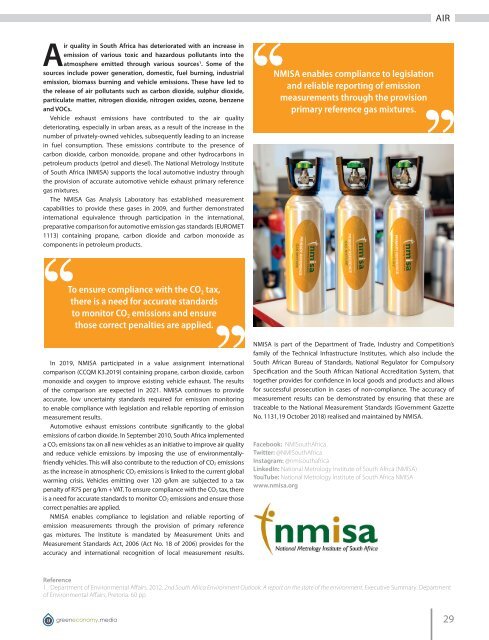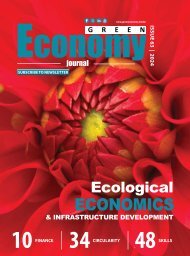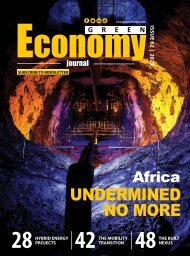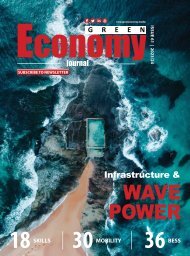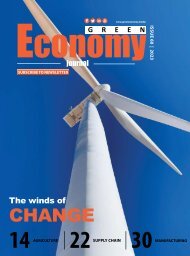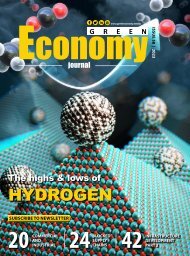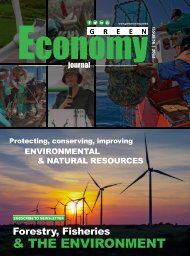Green Economy Journal Issue 41
You also want an ePaper? Increase the reach of your titles
YUMPU automatically turns print PDFs into web optimized ePapers that Google loves.
AIR<br />
Air quality in South Africa has deteriorated with an increase in<br />
emission of various toxic and hazardous pollutants into the<br />
atmosphere emitted through various sources 1 . Some of the<br />
sources include power generation, domestic, fuel burning, industrial<br />
emission, biomass burning and vehicle emissions. These have led to<br />
the release of air pollutants such as carbon dioxide, sulphur dioxide,<br />
particulate matter, nitrogen dioxide, nitrogen oxides, ozone, benzene<br />
and VOCs.<br />
Vehicle exhaust emissions have contributed to the air quality<br />
deteriorating, especially in urban areas, as a result of the increase in the<br />
number of privately-owned vehicles, subsequently leading to an increase<br />
in fuel consumption. These emissions contribute to the presence of<br />
carbon dioxide, carbon monoxide, propane and other hydrocarbons in<br />
petroleum products (petrol and diesel). The National Metrology Institute<br />
of South Africa (NMISA) supports the local automotive industry through<br />
the provision of accurate automotive vehicle exhaust primary reference<br />
gas mixtures.<br />
The NMISA Gas Analysis Laboratory has established measurement<br />
capabilities to provide these gases in 2009, and further demonstrated<br />
international equivalence through participation in the international,<br />
preparative comparison for automotive emission gas standards (EUROMET<br />
1113) containing propane, carbon dioxide and carbon monoxide as<br />
components in petroleum products.<br />
NMISA enables compliance to legislation<br />
and reliable reporting of emission<br />
measurements through the provision<br />
primary reference gas mixtures.<br />
To ensure compliance with the CO 2 tax,<br />
there is a need for accurate standards<br />
to monitor CO 2 emissions and ensure<br />
those correct penalties are applied.<br />
In 2019, NMISA participated in a value assignment international<br />
comparison (CCQM K3.2019) containing propane, carbon dioxide, carbon<br />
monoxide and oxygen to improve existing vehicle exhaust. The results<br />
of the comparison are expected in 2021. NMISA continues to provide<br />
accurate, low uncertainty standards required for emission monitoring<br />
to enable compliance with legislation and reliable reporting of emission<br />
measurement results.<br />
Automotive exhaust emissions contribute significantly to the global<br />
emissions of carbon dioxide. In September 2010, South Africa implemented<br />
a CO 2 emissions tax on all new vehicles as an initiative to improve air quality<br />
and reduce vehicle emissions by imposing the use of environmentallyfriendly<br />
vehicles. This will also contribute to the reduction of CO 2 emissions<br />
as the increase in atmospheric CO 2 emissions is linked to the current global<br />
warming crisis. Vehicles emitting over 120 g/km are subjected to a tax<br />
penalty of R75 per g/km + VAT. To ensure compliance with the CO 2 tax, there<br />
is a need for accurate standards to monitor CO 2 emissions and ensure those<br />
correct penalties are applied.<br />
NMISA enables compliance to legislation and reliable reporting of<br />
emission measurements through the provision of primary reference<br />
gas mixtures. The Institute is mandated by Measurement Units and<br />
Measurement Standards Act, 2006 (Act No. 18 of 2006) provides for the<br />
accuracy and international recognition of local measurement results.<br />
NMISA is part of the Department of Trade, Industry and Competition’s<br />
family of the Technical Infrastructure Institutes, which also include the<br />
South African Bureau of Standards, National Regulator for Compulsory<br />
Specification and the South African National Accreditation System, that<br />
together provides for confidence in local goods and products and allows<br />
for successful prosecution in cases of non-compliance. The accuracy of<br />
measurement results can be demonstrated by ensuring that these are<br />
traceable to the National Measurement Standards (Government Gazette<br />
No. 1131,19 October 2018) realised and maintained by NMISA.<br />
Facebook: NMISouthAfrica<br />
Twitter: @NMISouthAfrica<br />
Instagram: @nmisouthafrica<br />
LinkedIn: National Metrology Institute of South Africa (NMISA)<br />
YouTube: National Metrology Institute of South Africa NMISA<br />
www.nmisa.org<br />
Reference<br />
1. Department of Environmental Affairs. 2012. 2nd South Africa Environment Outlook. A report on the state of the environment. Executive Summary. Department<br />
of Environmental Affairs, Pretoria. 60 pp<br />
greeneconomy.media<br />
29


